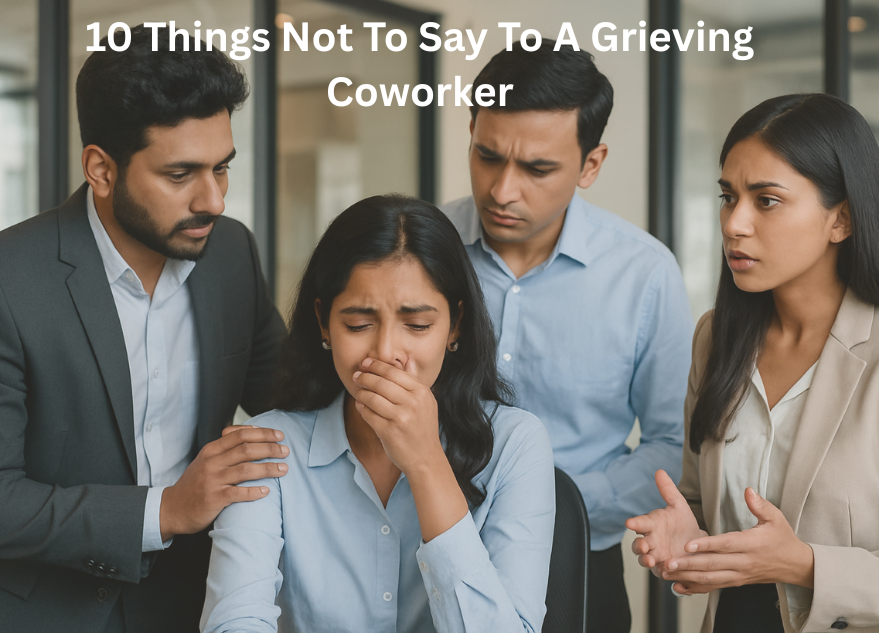Grief doesn’t stop at the office door. When a colleague loses a loved one, offering thoughtful support is crucial. It takes more than sympathy—it requires emotional intelligence, empathy, and sensitivity in the workplace.
💡 Are you looking for Coworking space in Gurgaon, Noida or Delhi? We are just a call away. Call Now: 08999 828282
10 Things You Should Never Say to a Grieving Coworker
- I know exactly how you feel
- They’re in a better place
- At least they lived a long life
- Everything happens for a reason
- You need to stay strong
- Let me know if you need anything.
- Time heals all wounds
- At least they’re no longer suffering
- You’re back already?
- It’s time to move on
1. I know exactly how you feel
Why it hurts:
Even if you’ve experienced grief before, no two people feel the same way about loss. Saying this unintentionally shifts the focus to your experience, rather than validating theirs.
What to say instead:
“I can’t imagine what you’re going through, but I’m here if you ever want to talk or need anything.”
This response acknowledges their pain without trying to compare or minimize it. It reflects emotional intelligence at work by centering their feelings, not yours.

2. They’re in a better place
Why it hurts:
While this phrase might feel comforting to some, it assumes the person shares your spiritual or religious beliefs. It can come across as impersonal or even dismissive of their emotional pain.
What to say instead:
“I’m really sorry for your loss. I know how deeply you must be hurting.”
This response keeps the focus on grief support rather than philosophical justification. It’s about being there, not offering explanations.
Also Read: Use These 7 Steps to Set Boundaries With Oversharing Coworkers
3. At least they lived a long life
Why it hurts:
This phrase can feel like you’re trying to rationalize the loss. But grief doesn’t disappear just because someone had a long life. Love doesn’t care about age.
What to say instead:
“Losing someone is never easy, no matter how long they were with us.”
Use this moment to show workplace empathy by recognizing that grief isn’t measured in years but in emotional connection.
4. Everything happens for a reason
Why it hurts:
This well-meaning but abstract phrase can sound like you’re trying to make sense of something that, to the grieving person, feels senseless. It often feels cold and philosophical when what’s really needed is warmth and understanding.
What to say instead:
“I don’t have the right words, but please know I’m here for you.”
By acknowledging the loss without needing to explain it, you honor the depth of their experience and offer real grief support.
5. You need to stay strong
Why it hurts:
Grieving is already emotionally exhausting. Telling someone to “stay strong” can feel like pressure to hold back their emotions—especially in the workplace.
What to say instead:
“It’s okay to feel overwhelmed. If you ever need time or space, I’m here to help however I can.”
This shows emotional intelligence at work by giving them permission to feel their emotions instead of bottling them up.
6. Let me know if you need anything.
Why it hurts:
While kind in intent, this puts the responsibility on the grieving person to ask for help—something they might not have the energy or clarity to do.
What to say instead:
“Can I help by covering your meeting today?”
“Would you like me to grab you lunch this week?”
These grief support examples are specific, helpful, and remove the burden of decision-making from your coworker.
7. Time heals all wounds
Why it hurts:
Grief doesn’t follow a calendar. Healing is not guaranteed to happen quickly or even completely. This phrase can feel dismissive to someone in deep pain.
What to say instead:
“Take all the time you need. There’s no rush to feel ‘okay.’ We’re here for you.”
This type of response is rooted in grief management—acknowledging that the process is personal and nonlinear.
8. At least they’re no longer suffering
Why it hurts:
This is another phrase that’s meant to comfort but can feel like it’s ignoring how painful the loss is. Even if someone passed peacefully, their absence is still deeply felt.
What to say instead:
“I know how much they meant to you. I’m really sorry you have to go through this.”
Use workplace empathy to acknowledge both the loss and the love behind the grief.
💡 Are you looking for Coworking space in Gurgaon, Noida or Delhi? We are just a call away. Call Now: 08999 828282
9. You’re back already?
Why it hurts:
Even if you’re surprised by their quick return to work, pointing it out may make them feel like they’re being judged for how they’re coping.
What to say instead:
“It’s good to see you back. If there’s anything you need or want to ease back in, let me know.”
This type of comment shows emotional intelligence at work and keeps the door open for support without judgment.
10. It’s time to move on
Why it hurts:
Grief doesn’t have a deadline. Telling someone to “move on” implies that their emotions are inconvenient or excessive.
What to say instead:
“Take all the time you need. We’ll support you every step of the way.”
Offering continued grief support is one of the most powerful ways you can show up for a grieving coworker.
Grief is personal. There’s no perfect script—but there is a better way to be supportive. Choosing your words with care and empathy is a sign of strong emotional intelligence at work. Sometimes the most powerful thing you can do is just show up, listen, and be there without judgment or pressure.
By avoiding these 10 common phrases, you help create a workplace where people feel understood, supported, and respected—even in their hardest moments. At The Office Pass (TOP), we foster compassionate and inclusive work environments that prioritize well-being and support. Connect with us today at 89998 28282 to learn how TOP can help build a workplace culture that truly cares.
FREQUENTLY ASKED QUESTIONS (FAQS):
Question: What should I say to a coworker who just lost a loved one?
Answer: Keep it simple and sincere. Say something like:
“I’m so sorry for your loss. Please know I’m here for you.”
This shows workplace empathy without trying to fix their grief.
Question: What is the best way to support a grieving coworker at work?
Answer: Offer practical help (e.g., covering tasks), check in occasionally, and give them space to grieve. Practicing emotional intelligence at work means recognizing what they need—even if it’s silence or time alone.
Question: Should I mention the loss or avoid the topic?
Answer: Don’t ignore it. Acknowledge their loss gently. Avoiding it can feel like you don’t care. Even a simple “I’m thinking of you” can offer real grief support.
Question: Is it okay to ask them how they’re feeling?
Answer: Yes, but with care. Avoid pressing for details. Say something like:
“How are you doing today?”
This opens the door while giving them the freedom to share—or not.
Question: How long should I give a coworker space after a loss?
Answer: There’s no set timeline. Respect their pace. Some may return to normal tasks quickly; others may need weeks or months. Practicing grief management at work means offering ongoing understanding.
Question: What are the signs that a coworker might need more support?
Answer: Look for changes in behavior: isolation, emotional outbursts, or declining performance. These can signal they’re still struggling and may benefit from extra grief support or even HR/mental health resources.
Question: Can workplace grief affect productivity and morale?
Answer: Absolutely. A grieving employee can experience fatigue, distraction, and mood changes. That’s why emotional intelligence at work and a compassionate culture are essential for overall team health.
Question: What role should managers play in grief support?
Answer: Managers should lead with workplace empathy, offer flexible time off, lighten workloads, and create a safe environment for open communication.
Question: Are there any company policies that help with grief management?
Answer: Yes, Many workplaces offer bereavement leave, employee assistance programs (EAPs), or mental health resources. Make sure your coworker knows what’s available.
Question: Why is it important to avoid saying cliché phrases like ‘stay strong’?
Answer: Clichés often dismiss or downplay pain. Using more thoughtful, personalized language shows true emotional intelligence at work and helps your coworker feel seen and supported.



